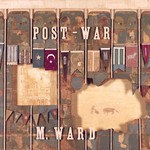Post-War
Studio Album by M. Ward released in 2006Poison Cup | |
To Go Home | |
Right in the Head | |
Post-War | |
Requiem | |
Chinese Translation | |
Eyes on the Prize | |
Magic Trick | |
Neptune's Net | |
Rollercoaster | |
Today's Undertaking | |
Afterword / Rag |
Post-War review
Rock songs and lyrical ballads make up a wonderful album
With each creation American singer, songwriter and guitarist Matt Ward, better known as M. Ward, says a new word in the music industry. The same is true about the follow up to the artist’s 2005 record Transistor Radio, the fifth full-length album Post-War released this August. This is a thematic work devoted to the problem of America’s recreation after the war in Iraq and the indivudual conception of these tragic events. Before to start recording the album, M. Ward has studied the postwar music of the late 1940s and 1950s to find out how the authors and performers of that time fulfilled the idea of helping people come back by means of listening to music. Following his aim, on each track of Post-War inventive M. Ward has managed to create a special combination of sullen and happy, thus making a contrast between the horror of the war and the gladness that it is over. The record boasts professional arrangements and unique audio effects, but its primary plus is in the singer’s remarkable vocals, that pass every shade of mood to the listeners causing them either smile or cry. Rock songs and lyrical ballads make up a wonderful album, pretending to the name of this year’s best creation.
Post-War is an earnest conceptual album and a real musical masterpiece
Post-War leaves an unforgettable impression and demands more than one listen, for M. Ward’s guitar playing skills can impress the most captious critics and the studio processing of the tracks is done perfectly. The singer refines each track with finger picking and rocky strings, and there are even two instrumental compositions on Post-War – Neptune’s Net and the closer Afterword,Rag. After the true joy of the opener Poison Cup, a beautiful love song, a very pleasant surprise is awaiting us on the amazing cover of Daniel Johnston’s ballad To Go Home, the song about the soldiers dreaming to reunite with their families. M. Ward’s singing is filled with bitterness and later with hope on the title track Post-War, where he suggets looking towards the future and trying to forget about the awful past. A very emotionally strong blues composition Right in the Head tells a story of two brothers, one being worried about the other, but it sounds by no means tragically for the moving rhythm and great guitar solos add hope to the plot of the song. M. Ward is trying to learn answers from an old man beneath a tree on a deeply philosophical song Chinese Translation, which is one of the highlights on the record. Apart from being an earnest conceptual album, Post-War is a real musical masterpiece.
Post-War wants all of your attention
Making a conceptual album often goes side by side with the risk of a making it boring or drawn out to a great length. Luckily this is not the case with Post-War. Choosing the topic of the post-war time M. Ward has followed his intuition and desire to encourage his countrymen, many of who have survived tragedies in their families. The musician has tried his best not to make the album too sad and too optimistic, adhering to the happy medium and striving for the adequacy of the apprehension. He has composed soft catchy melodies and transcribed them so that there was a negative and a positive feel on all the tracks, and the lyrics carry the main ideas. The interesting blend of jazz, blues and rock elements in M. Ward’s singing and playing guitar will leave nobody indifferent, not to mention the special audio effects he uses in the background of most of the tracks. Post-War wants all of your attention, evoking controversial emotions that come to order only when you have thought everything about it and let the album stay in your mind for some time. Hopefully, the next creation from this irrefutably talented musician is going to be inspired by something more peaceful and associated only with gladness.

